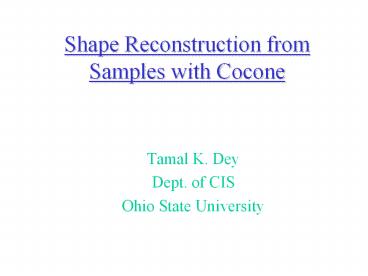Shape Reconstruction from Samples with Cocone - PowerPoint PPT Presentation
1 / 58
Title:
Shape Reconstruction from Samples with Cocone
Description:
A point set from satelite imaging. A reconstruction with and without noise ... Sampling is easy and convenient with advanced technology ... – PowerPoint PPT presentation
Number of Views:57
Avg rating:3.0/5.0
Title: Shape Reconstruction from Samples with Cocone
1
Shape Reconstruction from Samples with Cocone
- Tamal K. Dey
- Dept. of CIS
- Ohio State University
2
A point cloud and reconstruction
3
Surface meshing from sample
4
A point set from satelite imaging
5
A reconstruction with and without noise
6
Why Sample Based Modeling?
- Sampling is easy and convenient with advanced
technology - Automatization (no manual intervention for
meshing) - Uniform approach for variety of inputs (laser
scanner, probe digitizer, MRI,scientific
simulations) - Robust algorithms are available
7
Challenges
- Nonuniform data
- Boundaries
- Undersampling
- Large data
- Noise
8
Nonuniform data
9
Boundaries
10
Undersampling
11
Large data
3.4 million points
12
Cocone
- Cocone meets the challenges
- It guarantees geometrically close surface with
same topological type - Detects boundaries
- Detects undersampling
- Handles large data (Supercocone)
- Watertight surface (Tight Cocone)
13
e-Sampling (ABE98)
f(x) is the distance to medial axis
Each x has a sample within ef(x)
14
Voronoi/Delaunay
15
Surface and Voronoi Diagram
- Restricted Voronoi
- Restricted Delaunay
- skinny Voronoi cell
- poles
16
Cocone algorithm
- Cocone
Space spanned by vectors making angle q? ?/8 with
horizontal
17
Radius, height and neighbors
- p? is the farthest point from p in the cocone.
- radius r(p) p? radius of cocone
- height h(p) min distance to the poles
- cocone neighbors Np
18
Flatness condition
- Vertex p is flat if
1. Ratio condition r(p) ? ? h(p)
2. Normal condition ?v(p),v(q) ? ? ?q with p?Nq
19
Boundary detection
Boundary(P,?,?) Compute the set R of flat
vertices while ?p?R and p?Nq with q?R
and r(p)??h(p) and ?v(p),v(q) ??
RR?p endwhile return P\R end
20
Detected Boundary Samples
21
Detected Boundary Samples
22
Undersampling repaired
23
Holes are created
24
Tight Cocone
Guarantee A water tight surface no matter how
the input is.
25
Tight Cocone output
26
Holes are created
27
Hole filling
28
Time
29
Time
30
Large Data
- Delaunay takes space and time
- Exact computation is necessary. Doubles the time.
Floating point
Exact arithmetic
31
Large Data (Supercocone)
- Octree subdivision
32
Cracks
- Cracks appear in surface computed from octree
boxes
33
Surface matching
34
Davids Head
2 mil points, 93 minutes
35
Lucy25
3.5 million points, 198 mints
36
Shape of arbitrary dimension
37
Tangent and Normal Polytopes
- T?(p) V(p)?T(p)
- N?(p) V(p)?N(p)
38
Experiments
39
Sample Decimation
Original 40K points
- 0.4
- 8K points
- 0.33
- 12K points
40
Rocker
- ? 0.33
- 11K points
Original 35K points
41
Bunny
- ? 0.4
- 7K points
- ? 0.33
- 11K points
Original 35K points
42
Bunny
- ? 0.4
- 7K points
- ? 0.33
- 11K points
Original 35K points
43
Triangle Aspect Ratio
44
Medial axis
45
Medial axis
46
Noise
Cleaned
Outliers
47
Noise (Local)
This is a challenge unsolved. Perturbation by
very tiny amount is tolerated by Cocone.
48
Boundaries
Engineering
Medical
49
Geometric Models
Sports
Drug design
50
Geometric Models
Entertainment
Mathematical
51
Meshing
52
Boundary Detection
53
Data set Engine
54
Undersampling for Nonsmoothness
55
Modeling by Parts
56
Simplification
- Sample decimation vs. model decimation
57
Guarantees
- Topology preserved, no self intersection,
feature dependent
13751 tri
3100 tri
58
Multiresolution
7102 tri
15766 tri
10202 tri
59
Model Analysis
- Feature line detection
- Detection of dimensionality
60
Mixed Dimensions
61
Model Reconstruction after Data Segmentation
62
Conclusions
- SBGM with Del/Vor diagrams has great potential
- Challenges are
- Boundaries
- Nonsmoothness
- Noise
- Large data
- Robust simplification
- Robust feature detection































